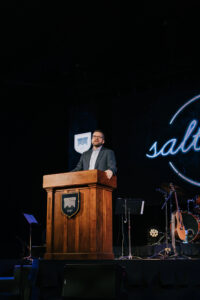
Earlier this semester, Dr. Nathan Busenitz visited The Master’s University to speak in chapel on the biblical definition of success. His message fit neatly within the year’s ongoing chapel theme, Salt & Light, presenting how believers can live distinctly in the world by functioning under a very different definition of success than what the world offers.
Busenitz, who serves as dean of faculty and associate professor of theology at The Master’s Seminary, began by looking at the examples of three men: Jonathan Edwards, D. L. Moody, and C. T. Studd. The first was a child prodigy, the second a wealthy salesman, and the third a celebrated athlete. But all three left behind their “potential” to enter ministry.
Busenitz emphasized that the point of these examples isn’t that full-time ministry is the only road to success for believers. Neither should a believer lack zeal to excel in the arena God calls them to, whether it be business, medicine, athletics, etc. But these three men demonstrated through their lives that the biblical perspective on success is highly countercultural.
The main text of the sermon was 2 Corinthians 5:6-10, where Paul outlines our motivation in life as believers:
“Therefore, being always of good courage, and knowing that while we are at home in the body we are absent from the Lord — for we walk by faith, not by sight — we are of good courage and prefer rather to be absent from the body and to be at home with the Lord.
“Therefore we also have as our ambition, whether at home or absent, to be pleasing to Him. For we must all appear before the judgment seat of Christ, so that each one may be recompensed for his deeds in the body, according to what he has done, whether good or bad” (LSB).

Dr. Nathan Busenitz, dean of faculty and associate professor of theology at The Master’s Seminary, spoke in TMU’s chapel earlier this semester.
From this passage, Busenitz developed three components of Paul’s view of success: a right mindset, a right motivation and a right measure. Understanding these ingredients, Busenitz said, “radically changes our priorities and pursuits.”
As Paul explains in this passage, the right mindset for success is an eternal mindset. In order to pursue true success, we must evaluate all things in light of the fact that this life is temporary.
“When we view life like Paul did, through the lens of eternity,” Busenitz said, “when we remember that one day this body, this life, will end, and we will be ushered into the presence of the Lord, it changes the way we think about everything. It changes our priorities. It changes our pursuits.”
In light of this fact, the right motivation for success is to please Christ. Busenitz reminded TMU students that getting an A or winning an athletic competition does not necessarily constitute real success. God cares about why we do things, not simply what we do. And this should change everything about how we pursue achievement because God Himself is the right measure of success.
“God is the one who determines whether or not your life is successful. He is the measure of your success,” Busenitz said. “One day, you will stand before Christ. And knowing that should change the way you think about success in this life.”
In the world’s eyes, Paul died as a failure and a criminal. But in God’s eyes, he had fought the good fight, finished the race and kept the faith (2 Timothy 4:7). Busenitz encouraged TMU students to live their lives likewise in light of this true definition of success.
“Those principles,” Busenitz said, “applied to your life, will give you the kind of success that the world may never understand, but that we’ll all celebrate together for all of eternity.”
Busenitz’s charge reflects TMU’s desire for each of its students. The University aims to equip each student with the skills and knowledge necessary to excel in their chosen career path. But more importantly, it works to instill the wisdom necessary for them to live all of life in pursuit of what Scripture defines as true success.
To find Busenitz’s sermon as well as other past chapel messages, see the chapel page.

The Master’s University and Seminary admit students of any race, color, national and ethnic origin to all the rights, privileges, programs, and activities generally accorded or made available to students at the school. It does not discriminate on the basis of race, color, national and ethnic origin in the administration of its educational policies, admissions policies, scholarship and loan programs, and athletic and other school-administered programs.
21726 Placerita Canyon Road
Santa Clarita, CA 91321
1-800-568-6248
© 2025 The Master’s University Privacy Policy Copyright Info
| Cookie | Duration | Description |
|---|---|---|
| cookielawinfo-checkbox-analytics | 11 months | This cookie is set by GDPR Cookie Consent plugin. The cookie is used to store the user consent for the cookies in the category "Analytics". |
| cookielawinfo-checkbox-functional | 11 months | The cookie is set by GDPR cookie consent to record the user consent for the cookies in the category "Functional". |
| cookielawinfo-checkbox-necessary | 11 months | This cookie is set by GDPR Cookie Consent plugin. The cookies is used to store the user consent for the cookies in the category "Necessary". |
| cookielawinfo-checkbox-others | 11 months | This cookie is set by GDPR Cookie Consent plugin. The cookie is used to store the user consent for the cookies in the category "Other. |
| cookielawinfo-checkbox-performance | 11 months | This cookie is set by GDPR Cookie Consent plugin. The cookie is used to store the user consent for the cookies in the category "Performance". |
| viewed_cookie_policy | 11 months | The cookie is set by the GDPR Cookie Consent plugin and is used to store whether or not user has consented to the use of cookies. It does not store any personal data. |
Notifications